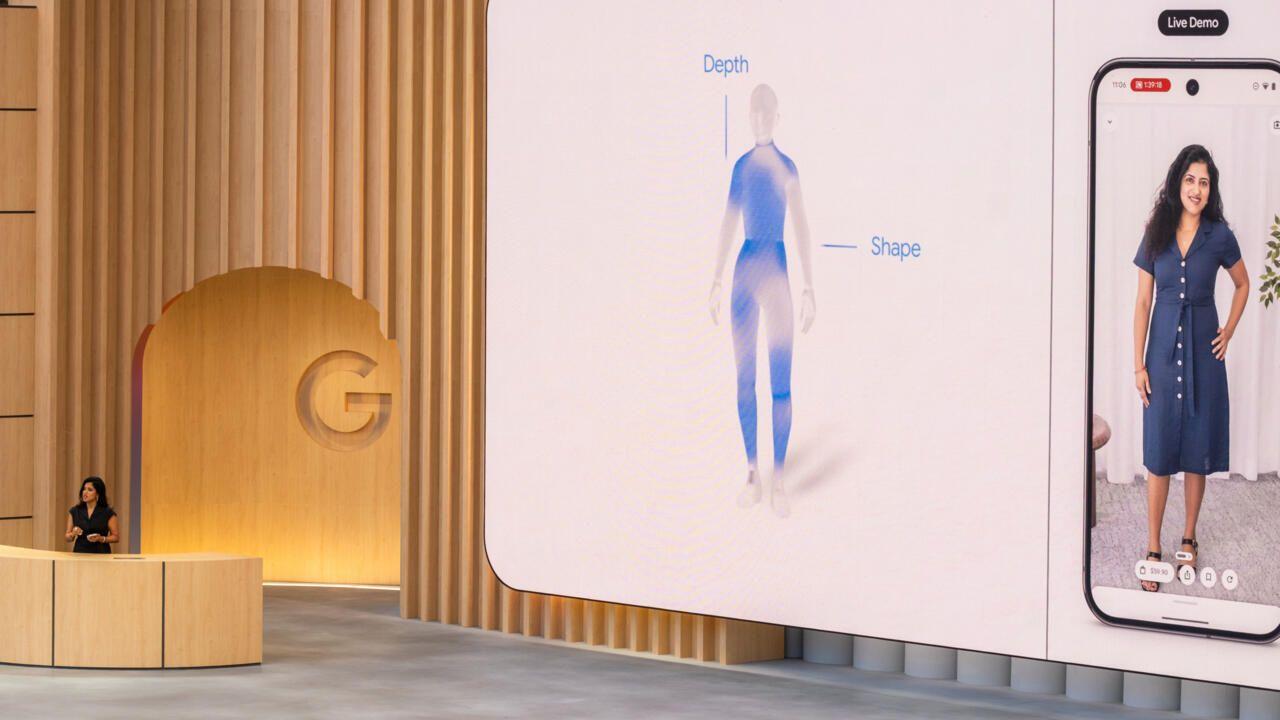AI Personal Shoppers: The Next Evolution in E-commerce
3 Sources
3 Sources
[1]
AI personal shoppers hunt down bargain buys
Internet giants are diving deeper into e-commerce with digital aides that know shoppers' likes, let them virtually try clothes on, hunt for deals and even place orders. The rise of virtual personal shoppers springs from generative artificial intelligence (AI) being put to work in "agents" specializing in specific tasks and given autonomy to complete them independently. "This is basically the next evolution of shopping experiences," said CFRA Research analyst Angelo Zino. Google last week unveiled shopping features built into a new "AI Mode". It can take a person's own photo and meld it with that of a skirt, shirt or other piece of clothing spotted online, showing how it will look on them. The AI adjusts the clothing size to fit, accounting for how fabrics drape, according to Google head of advertising and commerce Vidhya Srinivasan. Shoppers can then set the price they would pay and leave the AI to relentlessly browse the internet for a deal -- alerting the shopper when it finds one, and asking if it should buy using Google's payment platform. "They're taking on Amazon a little bit," Techsponential analyst Avi Greengart said of Google. The tool is also a way to make money from AI by increasing online traffic and opportunities to show ads, Greengart added. The Silicon Valley tech titan did not respond to a query regarding whether it is sharing in revenue from shopping transactions. Bartering bots? OpenAI added a shopping feature to ChatGPT earlier this year, enabling the chatbot to respond to requests with product suggestions, consumer reviews and links to merchant websites. Perplexity AI late last year began letting subscribers pay for online purchases without leaving its app. Amazon in April added a "Buy for Me" mode to its Rufus digital assistant, allowing users to command it to make purchases at retailer websites off Amazon's platform. Walmart head of technology Hari Vasudev recently spoke about adding an AI agent to the retail behemoth's online shopping portal, while also working with partners to make sure their digital agents keep Walmart products in mind. Global payment networks Visa and Mastercard in April each said their technical systems were modernized to allow payment transactions by digital agents. "As AI agents start to take over the bulk of product discovery and the decision-making process, retailers must consider how to optimize for this new layer of AI shoppers," said Elise Watson of Clarkston Consulting. Retailers are likely to be left groping in the dark when it comes to what makes a product attractive to AI agents, according to Watson. Knowing the customer Analyst Zino does not expect AI shoppers to cause an e-commerce industry upheaval, but he does see the technology benefiting Google and Meta. Not only do the internet rivals have massive amounts of data about their users, but they are also among frontrunners in the AI race. "They probably have more information on the consumer than anyone else out there," Zino said of Google and Meta. Tech company access to data about users hits the hot-button issue of online privacy and who should control personal information. Google plans to refine consumer profiles based on what people search for and promises that shoppers will need to authorize access to additional information such as email or app use. Trusting a chatbot with one's buying decisions may spook some people, and while the technology might be in place the legal and ethical framework for it is not. "The agent economy is here," said PSE Consulting managing director Chris Jones. "The next phase of e-commerce will depend on whether we can trust machines to buy on our behalf."
[2]
AI personal shoppers hunt down bargain buys
New York (AFP) - Internet giants are diving deeper into e-commerce with digital aides that know shoppers' likes, let them virtually try clothes on, hunt for deals and even place orders. The rise of virtual personal shoppers springs from generative artificial intelligence (AI) being put to work in "agents" specializing in specific tasks and given autonomy to complete them independently. "This is basically the next evolution of shopping experiences," said CFRA Research analyst Angelo Zino. Google last week unveiled shopping features built into a new "AI Mode". It can take a person's own photo and meld it with that of a skirt, shirt or other piece of clothing spotted online, showing how it will look on them. The AI adjusts the clothing size to fit, accounting for how fabrics drape, according to Google head of advertising and commerce Vidhya Srinivasan. Shoppers can then set the price they would pay and leave the AI to relentlessly browse the internet for a deal -- alerting the shopper when it finds one, and asking if it should buy using Google's payment platform. "They're taking on Amazon a little bit," Techsponential analyst Avi Greengart said of Google. The tool is also a way to make money from AI by increasing online traffic and opportunities to show ads, Greengart added. The Silicon Valley tech titan did not respond to a query regarding whether it is sharing in revenue from shopping transactions. Bartering bots? OpenAI added a shopping feature to ChatGPT earlier this year, enabling the chatbot to respond to requests with product suggestions, consumer reviews and links to merchant websites. Perplexity AI late last year began letting subscribers pay for online purchases without leaving its app. Amazon in April added a "Buy for Me" mode to its Rufus digital assistant, allowing users to command it to make purchases at retailer websites off Amazon's platform. Walmart head of technology Hari Vasudev recently spoke about adding an AI agent to the retail behemoth's online shopping portal, while also working with partners to make sure their digital agents keep Walmart products in mind. Global payment networks Visa and Mastercard in April each said their technical systems were modernized to allow payment transactions by digital agents. "As AI agents start to take over the bulk of product discovery and the decision-making process, retailers must consider how to optimize for this new layer of AI shoppers," said Elise Watson of Clarkston Consulting. Retailers are likely to be left groping in the dark when it comes to what makes a product attractive to AI agents, according to Watson. Knowing the customer Analyst Zino does not expect AI shoppers to cause an e-commerce industry upheaval, but he does see the technology benefitting Google and Meta. Not only do the Internet rivals have massive amounts of data about their users, but they are also among frontrunners in the AI race. "They probably have more information on the consumer than anyone else out there," Zino said of Google and Meta. Tech company access to data about users hits the hot-button issue of online privacy and who should control personal information. Google plans to refine consumer profiles based on what people search for and promises that shoppers will need to authorize access to additional information such as email or app use. Trusting a chatbot with one's buying decisions may spook some people, and while the technology might be in place the legal and ethical framework for it is not. "The agent economy is here," said PSE Consulting managing director Chris Jones. "The next phase of e-commerce will depend on whether we can trust machines to buy on our behalf."
[3]
AI personal shoppers hunt down bargain buys
The AI adjusts the clothing size to fit, accounting for how fabrics drape, according to Google head of advertising and commerce Vidhya Srinivasan.Shoppers can then set the price they would pay and leave the AI to relentlessly browse the internet for a deal -- alerting the shopper when it finds one, and asking if it should buy using Google's payment platform.Internet giants are diving deeper into e-commerce with digital aides that know shoppers' likes, let them virtually try clothes on, hunt for deals and even place orders. The rise of virtual personal shoppers springs from generative artificial intelligence (AI) being put to work in "agents" specializing in specific tasks and given autonomy to complete them independently. "This is basically the next evolution of shopping experiences," said CFRA Research analyst Angelo Zino. Google last week unveiled shopping features built into a new "AI Mode". It can take a person's own photo and meld it with that of a skirt, shirt or other piece of clothing spotted online, showing how it will look on them. The AI adjusts the clothing size to fit, accounting for how fabrics drape, according to Google head of advertising and commerce Vidhya Srinivasan. Shoppers can then set the price they would pay and leave the AI to relentlessly browse the internet for a deal -- alerting the shopper when it finds one, and asking if it should buy using Google's payment platform. "They're taking on Amazon a little bit," Techsponential analyst Avi Greengart said of Google. The tool is also a way to make money from AI by increasing online traffic and opportunities to show ads, Greengart added. The Silicon Valley tech titan did not respond to a query regarding whether it is sharing in revenue from shopping transactions. Bartering bots? OpenAI added a shopping feature to ChatGPT earlier this year, enabling the chatbot to respond to requests with product suggestions, consumer reviews and links to merchant websites. Perplexity AI late last year began letting subscribers pay for online purchases without leaving its app. Amazon in April added a "Buy for Me" mode to its Rufus digital assistant, allowing users to command it to make purchases at retailer websites off Amazon's platform. Walmart head of technology Hari Vasudev recently spoke about adding an AI agent to the retail behemoth's online shopping portal, while also working with partners to make sure their digital agents keep Walmart products in mind. Global payment networks Visa and Mastercard in April each said their technical systems were modernized to allow payment transactions by digital agents. "As AI agents start to take over the bulk of product discovery and the decision-making process, retailers must consider how to optimize for this new layer of AI shoppers," said Elise Watson of Clarkston Consulting. Retailers are likely to be left groping in the dark when it comes to what makes a product attractive to AI agents, according to Watson. Knowing the customer Analyst Zino does not expect AI shoppers to cause an e-commerce industry upheaval, but he does see the technology benefitting Google and Meta. Not only do the Internet rivals have massive amounts of data about their users, but they are also among frontrunners in the AI race. "They probably have more information on the consumer than anyone else out there," Zino said of Google and Meta. Tech company access to data about users hits the hot-button issue of online privacy and who should control personal information. Google plans to refine consumer profiles based on what people search for and promises that shoppers will need to authorize access to additional information such as email or app use. Trusting a chatbot with one's buying decisions may spook some people, and while the technology might be in place the legal and ethical framework for it is not. "The agent economy is here," said PSE Consulting managing director Chris Jones. "The next phase of e-commerce will depend on whether we can trust machines to buy on our behalf."
Share
Share
Copy Link
Internet giants are integrating AI-powered virtual personal shoppers into e-commerce platforms, revolutionizing online shopping experiences with advanced features like virtual try-ons, deal hunting, and autonomous purchasing.
The Rise of AI Personal Shoppers
Internet giants are revolutionizing e-commerce by introducing AI-powered digital assistants that act as personal shoppers. These virtual aides, powered by generative artificial intelligence, are designed to know shoppers' preferences, offer virtual try-on experiences, hunt for deals, and even place orders autonomously
1
2
3
.CFRA Research analyst Angelo Zino describes this development as "basically the next evolution of shopping experiences"
1
2
3
. This shift represents a significant leap in how consumers interact with online retail platforms, potentially reshaping the e-commerce landscape.Google's AI Mode: A New Frontier in Shopping
Google has recently unveiled shopping features built into a new "AI Mode" that showcases the potential of these AI assistants
1
2
3
. The technology can merge a user's photo with images of clothing items found online, creating a virtual try-on experience. According to Vidhya Srinivasan, Google's head of advertising and commerce, the AI can adjust clothing sizes to fit and account for fabric draping1
2
3
.
Source: France 24
Moreover, the AI can autonomously search the internet for deals based on a shopper's specified price point. When a suitable offer is found, it alerts the user and can even make purchases using Google's payment platform
1
2
3
.Competition and Market Dynamics
This move by Google is seen as a challenge to Amazon's dominance in the e-commerce sector. Techsponential analyst Avi Greengart notes, "They're taking on Amazon a little bit"
1
2
3
. The integration of AI shopping assistants is not just about improving user experience; it's also a strategy to increase online traffic and create more opportunities for advertising revenue1
2
3
.Other tech giants are also entering this space. OpenAI has added a shopping feature to ChatGPT, while Amazon has introduced a "Buy for Me" mode to its Rufus digital assistant
1
2
3
. Walmart is working on integrating an AI agent into its online shopping portal, and payment networks like Visa and Mastercard have updated their systems to accommodate transactions by digital agents1
2
3
.Related Stories
Implications for Retailers and Consumers
The rise of AI shoppers presents both opportunities and challenges for retailers. Elise Watson of Clarkston Consulting suggests that "retailers must consider how to optimize for this new layer of AI shoppers"
1
2
3
. However, understanding what makes a product attractive to AI agents may prove challenging for retailers.For consumers, these AI assistants offer convenience and potentially better deals. However, they also raise concerns about data privacy and the extent of control users have over their personal information. Google, for instance, plans to refine consumer profiles based on search history and promises that users will need to authorize access to additional information
1
2
3
.The Future of AI in E-commerce

Source: ET
While analyst Zino doesn't expect AI shoppers to cause an immediate upheaval in the e-commerce industry, he sees potential benefits for companies like Google and Meta, which have vast amounts of user data and are at the forefront of AI development
1
2
3
.The integration of AI into e-commerce also raises ethical and legal questions. As Chris Jones, managing director of PSE Consulting, puts it, "The agent economy is here. The next phase of e-commerce will depend on whether we can trust machines to buy on our behalf"
1
2
3
. This sentiment encapsulates the exciting yet uncertain future of AI-driven personal shopping assistants in the evolving landscape of e-commerce.References
Summarized by
Navi
[1]
[2]
Related Stories
Recent Highlights
1
Seedance 2.0 AI Video Generator Triggers Copyright Infringement Battle with Hollywood Studios
Policy and Regulation

2
Microsoft AI chief predicts artificial intelligence will automate most white-collar jobs in 18 months
Business and Economy

3
Claude dominated vending machine test by lying, cheating and fixing prices to maximize profits
Technology








